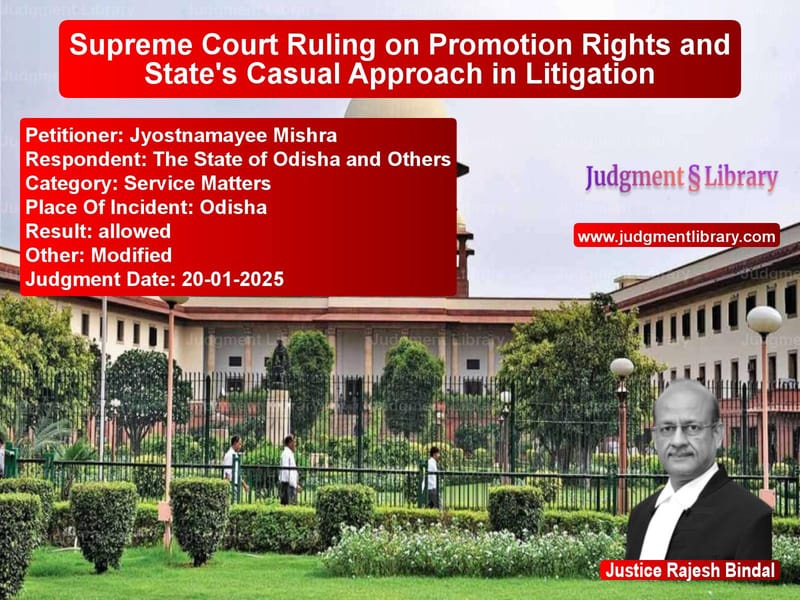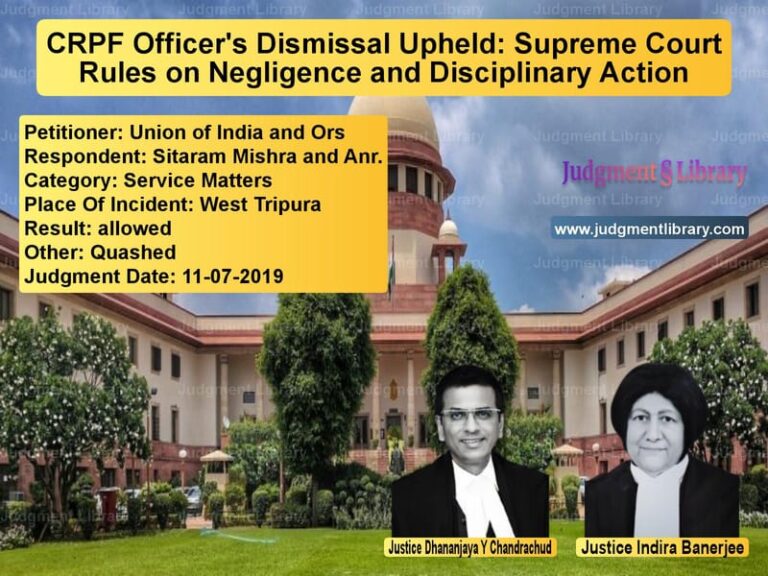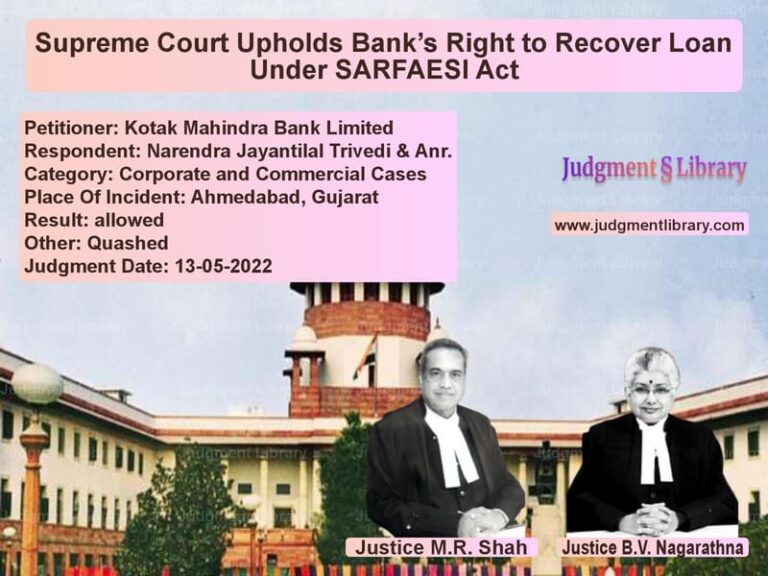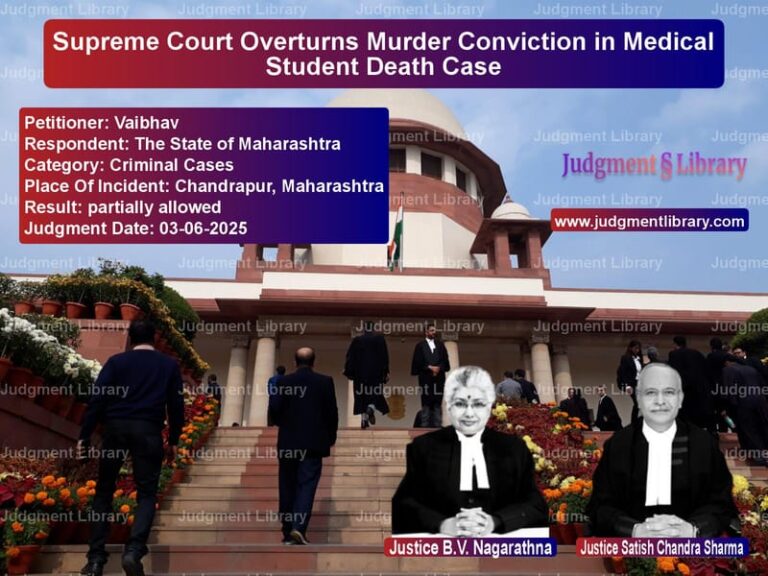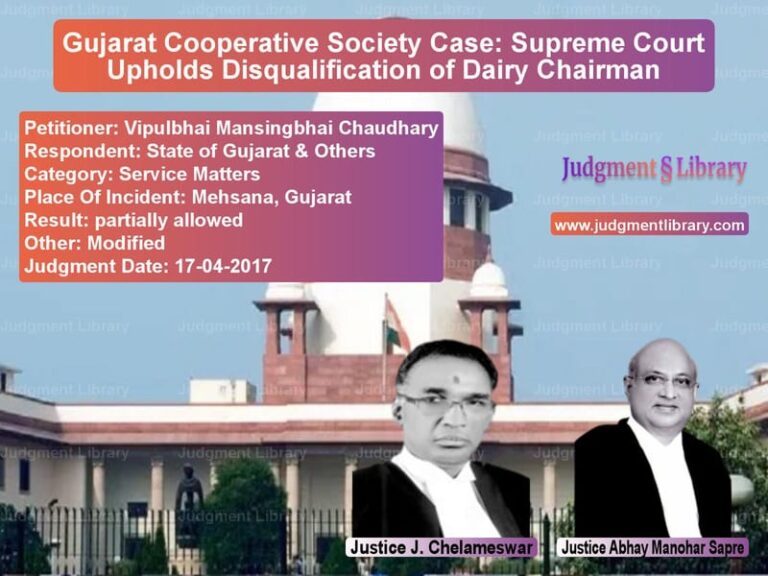Supreme Court Ruling on Promotion Rights and State’s Casual Approach in Litigation
The Supreme Court of India recently delivered a ruling in a case that highlighted the procedural flaws and the lack of attention to statutory rules by the State authorities. In JYOSTNAMAYEE MISHRA v. THE STATE OF ODISHA AND ORS., the Court addressed critical issues surrounding employee promotion, qualifications, and the State’s handling of legal disputes, emphasizing the importance of due diligence by the government in litigation.
The petitioner, Jyostnamayee Mishra, had filed a series of representations and litigations over several years, seeking promotion to the post of Tracer. Her case was complicated by the lack of clarity regarding the applicable promotion rules and the delay in resolving her grievance. This case also raised the important legal question of whether an employee can claim promotion to a post for which they do not fulfill the required criteria and whether the promotion can be granted without following proper procedures like public advertisements.
Background of the Case
Jyostnamayee Mishra, employed as a peon by the State of Odisha, filed her first representation in 1999 requesting promotion to the post of Tracer. She claimed to have the necessary qualifications and experience to hold the position. However, the respondent authorities rejected her request, citing various reasons, including the claim that the post of Tracer could only be filled by direct recruitment, not promotion from the lower cadre.
Over the years, the petitioner filed several applications before the Tribunal, including O.A. No. 628(C) of 1999, seeking intervention against the discriminatory action by the State authorities regarding her promotion. The Tribunal ruled in her favor, directing the authorities to consider her for promotion to the post of Tracer. However, despite these rulings, the authorities failed to act on the Tribunal’s orders.
In 2016, after more delays, the Tribunal directed that the petitioner be appointed to the position of Tracer against any available vacancy. Despite this, the State government filed a Writ Petition before the High Court, challenging the Tribunal’s decision, arguing that the petitioner was not eligible for the post as per the applicable rules. The High Court sided with the State, overturning the Tribunal’s order, leading the petitioner to approach the Supreme Court.
Key Legal Issues
- Whether an employee can claim promotion to a post for which they do not fall within the feeder cadre.
- Can the vacancy meant for direct recruitment be filled without a public advertisement?
- Whether the State’s failure to properly handle promotion cases and the casual approach in litigation affected the judicial process.
Arguments of the Parties
Petitioner’s Arguments
The petitioner, represented by her counsel, made the following arguments:
- The petitioner had the requisite qualifications and experience for the post of Tracer, which was acknowledged by the authorities in some instances.
- The failure of the State to promote her, despite her qualification, violated her rights under Article 14 of the Constitution.
- While the State had relied on a 1979 recruitment rule stating that the post of Tracer should be filled by direct recruitment, the petitioner contended that the rules were applied in an overly rigid manner, ignoring precedents where employees in similar situations were promoted.
- The petitioner had been discriminated against, as shown by the promotions of similarly situated employees, and her case deserved to be heard on merits.
Respondents’ Arguments
The respondents, represented by the State of Odisha, countered with the following points:
- The post of Tracer, as per the 1979 Rules, was a direct recruitment post and could not be filled through promotion.
- The petitioner did not fulfill the qualifications required for the post, particularly the experience or the certification prescribed under the rules.
- There had been no procedural violations in the handling of the petitioner’s case, and the State’s actions were in line with the legal framework.
- The claim of discrimination was unfounded, as the rules governing recruitment and promotion were clear and had been correctly followed in other cases.
Supreme Court’s Observations
The Supreme Court, after reviewing the arguments and the legal framework, observed:
“The issue raised in this case is not just a question of promotion but about the casual handling of litigation by the State authorities, which delayed the petitioner’s rightful promotion. This delay, coupled with the lack of clarity on the applicable rules, resulted in a miscarriage of justice.”
The Court criticized the approach of the State for not adhering to the proper procedures and failing to present relevant documents before the Tribunal and the High Court, which led to unnecessary prolongation of the case.
Final Judgment and Directions
The Supreme Court concluded:
- The High Court’s order was set aside, and the Tribunal’s direction to consider the petitioner for promotion to the post of Tracer was upheld.
- The State was directed to follow the rules and consider the petitioner’s promotion, taking into account her qualifications and the position held by similarly situated employees.
- The State was also ordered to address any procedural flaws in the handling of the petitioner’s case and to avoid unnecessary delays in future cases.
- If the petitioner was found to be eligible for promotion based on the merits, she should be given her rightful position along with any consequential benefits.
Implications of the Judgment
This judgment highlights the importance of adhering to statutory rules in employment matters and the consequences of state authorities failing to handle cases in a responsible and timely manner. The Court’s ruling emphasizes the need for transparency and fairness in the promotion and recruitment process, particularly when government agencies are involved.
Conclusion
The Supreme Court’s ruling in JYOSTNAMAYEE MISHRA v. THE STATE OF ODISHA AND ORS. serves as an important reminder to public authorities about the need for diligence in legal proceedings and the fair treatment of employees. By upholding the Tribunal’s decision, the Court reaffirmed the importance of following proper procedures in promotion cases and protecting the rights of employees under the Constitution.
Petitioner Name: Jyostnamayee Mishra.Respondent Name: The State of Odisha and Others.Judgment By: Justice Rajesh Bindal.Place Of Incident: Odisha.Judgment Date: 20-01-2025.
Don’t miss out on the full details! Download the complete judgment in PDF format below and gain valuable insights instantly!
Download Judgment: jyostnamayee-mishra-vs-the-state-of-odisha-supreme-court-of-india-judgment-dated-20-01-2025.pdf
Directly Download Judgment: Directly download this Judgment
See all petitions in Employment Disputes
See all petitions in Workplace Harassment
See all petitions in Promotion Cases
See all petitions in Judgment by Rajesh Bindal
See all petitions in allowed
See all petitions in Modified
See all petitions in supreme court of India judgments January 2025
See all petitions in 2025 judgments
See all posts in Service Matters Category
See all allowed petitions in Service Matters Category
See all Dismissed petitions in Service Matters Category
See all partially allowed petitions in Service Matters Category

